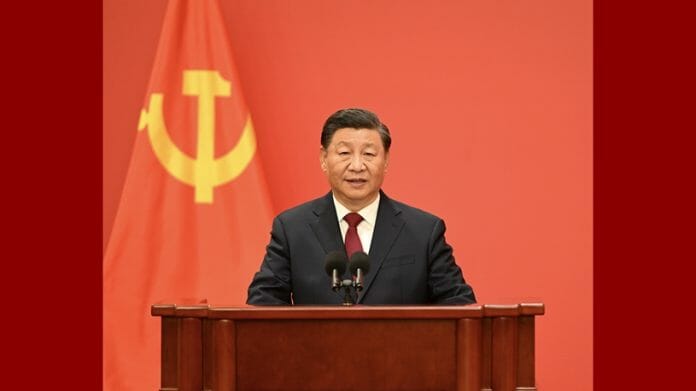With the final day of the 20th National Congress of the Communist Party of China, there was much discussion on changes in the top leadership apart from Xi Jinping retaining his position as the General Secretary for a record third term.
Among them were Li Qiang, Cai Qi, Ding Xuexiang, and Li Xi all being added to the Politburo standing committee. The CPC Constitution also saw amendment setting the new central task to be “advancing the rejuvenation of the Chinese nation on all fronts through a Chinese path to modernization. Concurrently, the upcoming Central Economic Work Conference and National Financial Work Conference are expected to announce key economic policy directions
At the press conference following the first plenum which occurred, Xi presented the CPC’s new central leadership including the other six members of the Standing Committee of the Political Bureau of the 20th CPC Central Committee named above.
According to HSBC economists, the Party Congress mainly focused on leadership reshuffle and the CPC Constitution Amendment, with only high-level discussions on economic development. For example, the amended Constitution states: “Basic socialist economic systems, including the system under which public ownership is the mainstay and diverse forms of ownership develop together, the system under which distribution according to work is the mainstay while multiple forms of distribution exist alongside it, and the socialist market economy, are important pillars of socialism with Chinese characteristics”.
The bank also noted with the conclusion of the Party Congress, Beijing will likely look towards more concrete steps to help solidify a growth recovery and work towards achieving its goal of reaching a ‘moderately prosperous society in an all-round way. This it said is expected to focus on turning towards new growth drivers like technology innovation and green development to drive high-quality sustainable growth in the coming years. Key events to look out for include the Central Economic Work Conference, typically held at the beginning of December, as well as the National Financial Work Conference, typically held every five years with the last session having occurred in July 2017.
The Central Economic Work Conference provides an update on the progress towards the annual economic targets laid out at the beginning of the year during the National People’s Congress, as well as laying out the key areas of economic focus for the coming year. However, unexpectedly persistent headwinds from COVID-19 uncertainty and weakened sentiment in the property market have made it more difficult to reach the ‘around 5.5%’ growth target laid out at the beginning of this year. Thus, HSBC expects the upcoming Central Economic Work Conference to focus on economic recovery.
The National Financial Work Conference will lay out the key areas of financial reform in the coming five years. There will likely be an alignment between economic goals and financial reform goals. Long-standing goals of preventing financial risk as well as further progress towards improving monetary policy implementation are expected to be in focus.
With Premier Li Keqiang due to step down from his position, his post will be filled officially at the National People’s Congress (NPC), expected in early March. That meeting will likely also see the announcement of further, concrete policy steps and priorities for the coming year, and beyond.









